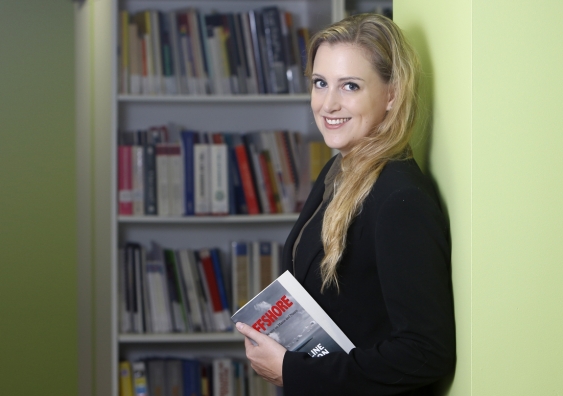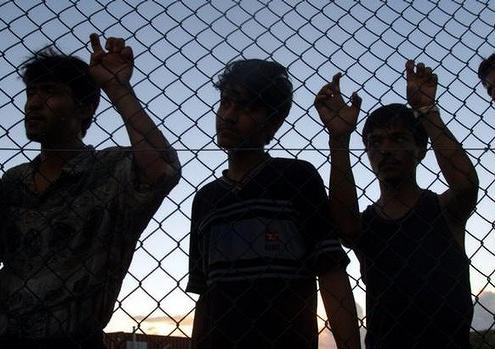New book lifts the lid on offshore detention
UNSW’s Madeline Gleeson has written a confronting account of life for asylum seekers in the Nauru and Manus Island refugee processing centres.
UNSW’s Madeline Gleeson has written a confronting account of life for asylum seekers in the Nauru and Manus Island refugee processing centres.

Clare Morgan
UNSW Media & Content
(02) 9385 8920
clare.morgan@unsw.edu.au
Since the Gillard government reopened Australia’s offshore processing centres on Nauru and Manus Island in 2012, it seems barely a week has gone by without stories of illness and mental health crises, allegations of inhuman and degrading treatment, reports of violence and even riots, and distressing accounts of self-harm and suicide attempts.
Many people have been dismayed and outraged by these accounts; others have been reassured by official statements that all is well and the centres are running smoothly; for some, the arguments proved too much and they simply switched off.
For Madeline Gleeson, the lack of transparency about what was happening so far away meant many Australians didn’t know what to believe.
Gleeson, a lawyer and research associate at the Andrew and Renata Kaldor Centre for International Refugee Law, has endeavoured to set out the facts in her new book, Offshore: Behind the wire on Manus and Nauru, which is officially launched by Julian Burnside QC today.
The book has been endorsed by journalist David Marr, who is quoted on the cover: “I thought I knew this saga but I learned so much. Stray details enter like a knife. After this, no one can claim Australia didn’t know what Australia was doing.”
That was certainly one of Gleeson’s main aims: to go beyond the rumours, allegations, secrecy and political spin to inform Australians about what has happened on Nauru and Manus Island since 2012. Armed with that information, they can then be encouraged to question what is being done in their name, using vast amounts of their money, to people who have sought their help.
Gleeson acknowledges that Australia’s immigration policy is an inherently heated, divisive and politicised topic, notorious for its tendency to veer towards extremes.
“People would say they came too late to the issue to have an informed opinion, or they regurgitated a line they had heard from the government, and that struck me as unacceptable,” she says. “And switching off is still picking a side because that’s allowing the government to continue to do what it’s been doing.
“I want this book to help Australians recognise how spin is being used, to recognise that you can’t assume a policy has been properly thought through, and to recognise that no news is not good news.
“If everyone read this book and said they were happy with how things are, with the abuse of children, the gang rape of men and women, then that would be that. But I don’t believe Australians feel that way. The problem is, the vast majority don’t have the information to make an informed decision.”

To gather that information Gleeson systematically went through publicly available sources including government and Department of Immigration interviews and media releases, media reports, submissions to inquiries and responses to those submissions as well as sources on Manus and Nauru.
“I did try to test the evidence, to decide how likely it would be that something happened. Some stories were very distressing but they didn’t ring true. But if you have allegations that are consistent and from multiple sources, and government responses that are evasive or just absent, that rings warning bells,” Gleeson says.
She was scrupulous about excising emotion and commentary from her account. “You are undermining your own purpose if you get too emotionally involved,” she says. “I didn’t want to provide a fact then tell a reader how to think about it.”
But her dispassionate telling makes the story even more powerful, such as doctors’ attempts to save the life of Reza Barati in the dark after the Manus riot in February 2014; the women on Nauru who slept in their jeans in the hope it would be harder to be raped by men at night; the six-year-old who tried to hang herself with a fence tie; the disintegration of detainees’ mental health as they lost all hope.
As Gleeson concludes in her book: “A problem shifted is not a problem solved, and the country as a whole faces a critical choice: allow abuse to continue in its name, with full knowledge of what is going on, or recognise that it is time for a new approach to the challenges of displacement – one that is effective, fair and humane.”
Offshore: Behind the wire on Manus and Nauru, published by NewSouth, will be launched on Monday, 9 May, at 6pm at the Hassell Studio, Level 2 Pier 8/9, 23 Hickson Rd, Sydney.